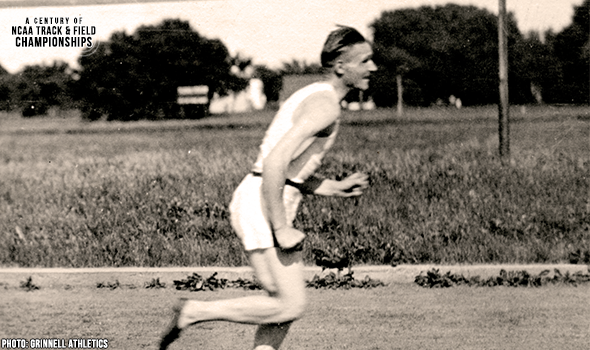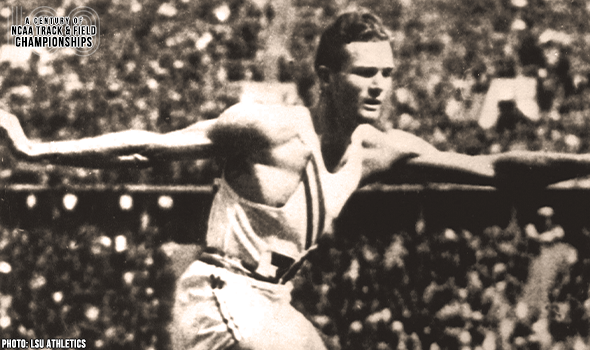
Falcon Flew To NCAA Distance Glory
Like his surname, Joe Falcon always swooped in at the right moment.
Known for his ferocious kick late in the race, Falcon captured seven individual NCAA titles between cross country, indoor track & field and outdoor track & field while competing for the University of Arkansas under legendary USTFCCCA Hall of Fame coach John McDonnell.
Falcon’s winning ways nearly started in the fall of his sophomore year at the 1986 NCAA Division I Cross Country Championships in Tucson, Arizona, but a recessed sprinkler head had other ideas. The Razorback standout ran on the shoulder of eventual winner Aaron Ramirez for most of the race before pulling away as they ascended the final hill. Shortly after, Falcon stepped in a sprinkler hole on the golf course, tumbled to the ground and had to settle for a runner-up finish (Don’t worry: Falcon atoned for that mishap the following year to become the program’s first individual national champion in cross country).
That incident most likely fueled Falcon’s fire over the next few years as little kept him from NCAA glory from that point forward.
After winning his first NCAA title the following March in the indoor 3000 meters, Falcon closed in a scintillating 55.1 to capture the 10,000-meter crown at the 1987 NCAA Division I Outdoor Track & Field Championships. That would be the first of seven 10K crowns for the Razorbacks over the years, which has helped them become the highest-scoring program in that event in meet history.
Falcon went back-to-back in the indoor 3000 the following year and added the mile crown to his ledger for good measure. When he returned to the outdoor meet a few months later, Falcon had his eyes squarely set on the 1500-meter title, something only one other man in program history was able to bring back to Fayetteville (Frank O’Mara in 1983).
True to form, Falcon stayed right behind the leader (Steve Balkey of Penn State) and blew past him in the final 500 meters. Falcon had company, though, as the Indiana duo of Mark Deady and Charles Marsala went with him. The Razorback runner held off the Hoosiers’ harriers to win by one second, 3:38.91 to 3:39.91 (Marsala) and 3:39.92 (Deady).
To this day, Falcon remains the only man in meet history to win national titles in both the 1500/mile and the 10,000 meters — and is just one of two men to score in both of those events at the national meet in his career (Two-time The Bowerman finalist Lawi Lalang is the other, winning the 10K title in 2013 and finishing runner-up in the 1500 one year later).
Falcon snagged another NCAA indoor mile crown in 1989 and anchored the Arkansas DMR team to an all-time world best in the DMR at the Penn Relays that same year. However, Falcon’s quest to defend his 1500-meter crown fell 1200 meters short in June after he was tripped and pushed to the ground less than one lap into the NCAA final, in what would be his final collegiate race.
The NCAA and collegiate track & field will mark a momentous milestone in the spring of 2021 -- the 100th anniversary of the NCAA Championships and with that, the NCAA Track & Field Championships. In June 1921, the University of Chicago hosted the first track & field championships in NCAA history.
This point can’t be emphasized enough: Not only was the event the first for NCAA track & field, but the first championships for any sport under the sponsorship of the NCAA.
To celebrate, over each of the next 365 days, the U.S. Track & Field and Cross Country Coaches Association (USTFCCCA) will celebrate moments, student-athletes, and coaches that have made a century’s worth of championships special. From humble beginnings to important historical milestones to the modern-day, collegiate track & field has evolved with the American society.
The 2021 edition of the NCAA Division I Outdoor Track & Field Championships begin with preliminary round action on May 27-29 in Jacksonville, Fla., and College Station, Texas. The championships final site and culmination of the celebration is slated for June 9-12, 2021 at the newly rebuilt Hayward Field in Eugene, Ore.

SIU’s Roggy Dominated The Javelin In 1978
Bob Roggy won the javelin title at the 1978 NCAA DI Outdoor T&F Championships by more than 20 feet. Roggy qualified first for the final with a MR heave of 89.30m (293‑0).

Makusha Made History In Bowerman Year Of 2011
Ngoni Makusha became just the fourth man in meet history to win individual titles in both the 100 and LJ. It was his 3rd career LJ crown and he set a CR in the 100 of 9.89.

George Mason’s Gage Shocked The NCAA LJ In 1988
Nena Gage won the long jump at the 1988 NCAA DI Outdoor T&F Championships in a shocking upset over Gail Devers.

Texas’ Thompson Marveled In NCAA Distance Events
Jerry Thompson won three career distance titles at the NCAA Outdoor T&F Championships. His first came in 1943. Then he won again in 1947 & 1948 after serving in World War II.

Grinnell’s Paulu Sprinted To NCAA History
Leonard Paulu was the first athlete to complete the 100-200 double in NCAA Outdoor Track & Field Championships history in 1922. That also made him the 1st to win back-to-back 100 titles, too.

Scott Won Back-To-Back NCAA Hammer Titles
Candice Scott won back-to-back hammer throw titles at the NCAA DI Outdoor T&F Championships in 2003 & 2004. Scott set a meet record of 69.77m (228-11) in that first year.

Drouin Soared To The Bowerman In 2013
Derek Drouin won two career HJ titles at the NCAA DI Outdoor T&F Championships. When Drouin won in 2013, he was only the fourth man to clear 2.34m (7-8) in meet history.

Watts Made Quick Work Of NCAA 400
Quincy Watts set a meet record in the 400 of 44.00 at the 1992 NCAA DI Outdoor Track & Field Championships. It lasted 25 years until 2017.

Iowa State’s Koll Rolled To 5K-10K Crowns
Lisa Koll won three career titles at the NCAA DI Outdoor T&F Championships in dominant fashion. Her average margin of victory in those 5K & 10K races was 37.73 seconds.

LSU’s Hardin Completed Unique 440-220H Double Twice
The nearly unheard of 440-220H double was so nice that Glenn Hardin did it twice! Hardin became the first to do so in meet history in 1933 and then swept them again in 1934.

